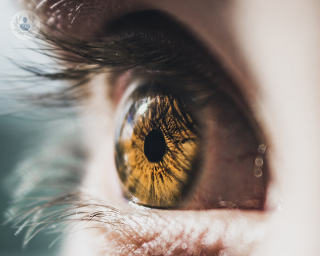Corneal abrasion
Mr Sameer Trikha - Ophthalmology
Created on: 09-29-2017
Updated on: 07-12-2023
Edited by: Conor Dunworth
What is corneal abrasion?
A corneal abrasion is one of the most common eye injuries and involves a scratch on the eye.
The cornea sits at the front of the eye and is a clear “window” to the back of the eye, where light is turned into optical signals. The role of the cornea is to focus the light that comes into your eye to provide a clear picture.

Is it serious?
Corneal abrasion is a common injury and generally should heal within a day or two, but in some cases can result in infection. If you suspect your eye may be infected, it is important to see a doctor as urgently as possible.
What are the symptoms?
The symptoms of corneal abrasion include:
- Pain
- The feeling that you have “grit” in your eye
- Redness
- Light sensitivity
How is corneal abrasion diagnosed?
Corneal abrasion is usually diagnosed by giving you an eye drop to numb the affected eye, then using a blue light or microscope to see the eye in more detail.
What causes corneal abrasion?
Anything that comes into contact with your eye can cause a scratch. Some common causes include:
- Getting sand, dust, ash, or makeup in your eye
- Poking your eye accidentally
- Rubbing your eye too hard
- Wearing poorly-fitted contact lenses or wearing them for too long
You’re at a greater risk of corneal abrasion if you have dry eyes, as this can cause your eyes to tear after being asleep.
How can corneal abrasion be prevented?
It can be difficult to prevent some causes of corneal abrasion, but you can take the following precautions to reduce your risk:
- Wear protective goggles when gardening, doing DIY, or doing industrial work that involves debris
- Making sure your contact lenses fit and that you are replacing them regularly
- Seek treatment if you have dry eyes
How is corneal abrasion treated?
If you suspect you have a corneal abrasion, it’s important to resist the urge to rub your eye, as this can cause any foreign body in the eye to scratch it further. The first task is to safely remove anything foreign to your eye, by:
- Gently rinsing the eye out with clean water
- Blinking several times
If you feel like something is in your cornea and you can’t remove it, see a doctor as soon as possible. Don’t try and remove it yourself with cotton swabs or tweezers.



